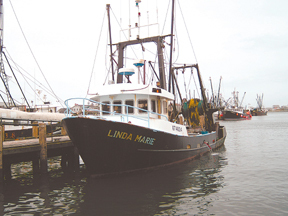U.S. Sen. Jack Reed will push for regulatory changes to expand the program
In the fall, the Rhode Island Community Food Bank added a new item to its list
of food for needy people and families: 10,010 pounds of scup, donated by local
fishermen and one dealer. The fish would have otherwise been thrown back into
the ocean.
The fish donated for “Fish for the Hungry” were “regulatory discard,” caught over the poundage quotas or trip limits established by the government, all of which are usually tossed overboard before the boats return. Six fishermen and one dealer donated a portion of what they caught during the month of November, and the food bank delivered them almost daily to six locations in Rhode Island.
“We thought it was a good cause, bottom line,” said Eric Reid, president of Deep Sea Fish of Rhode Island. “It was a good way to help people who are less fortunate.”
Fish caught above and beyond quotas are usually wasted – most discards don’t survive being caught in nets and hauled in – and it’s been estimated that as much as 10 million pounds of fish are discarded every year.
“We brought all of these people together to see if we could do anything about this to feed the hungry people,” said Bernie Beaudreau, the food bank’s executive director. “Fishermen hate wasting fish.”
Because of the overwhelming response to the fish donation, the food bank is planning another round of donations this month of scup and possibly whiting, herring and calamari, he said.
“We heard from the fishing industry about their rules, and some of them” were antiquated, “and how they were throwing away perfectly good fish because they went beyond their quota,” said U.S. Sen. Jack Reed, D-R.I.
The fishermen proposed donating them, and Reed and his staff began talks with the food bank and other groups.
The Rhode Island Community Food Bank made 16 trips with its 14-foot refrigerated truck to Galilee to pick up the 128 totes of scup that were held at three dealers and kept the fish on ice at all times. Staff and volunteers delivered the fish off the back of the truck to the food pantries on 23 distribution days – Monday through Saturday each week, except for two holidays.
According to the food bank, a total of 1,338 households representing 6,117 people received an average of 1.6 pounds of scup.
Communities like Providence, Blackstone Valley and Newport showed the greatest need, and the food bank specifically targeted people who knew how to prepare and considered scup an important part of their diet, like the Latino, Asian and other immigrant populations, Beaudreau said.
“The burden is on the food bank to take anything we get,” he said. “We had doubt about the success of fresh fish, but we knew people would love to get it.”
While there is nothing currently in place to waive the regulatory discharge statute, both Beaudreau and Reid, whose business donated more than 4,000 pounds of fish, said fishermen and other organizations hope to devise a special permit that would allow keeping the fish for this cause.
Reed said that he’s going to push for a change in the regulations, or if necessary, will go through the process of getting the language changed to include this program.
Ultimately, he said, he’d like to see the program expanded in New England and nationally.
“We take for granted that we can walk into the supermarket and buy whatever we want,” he said. “For these people, fish has always been part of their diet, and in some respects (this donation) was a wonderful thing. This fish would have been discarded anyway – this way the ‘by-catch’ can be used to feed the hungry. It’s a testament to the generosity of the fishermen.”
It’s an ongoing challenge to gather food for the food bank, Beaudreau said, but it’s even harder to find foods that appeal to different ethnic groups like the scup does to the immigrant community.
“It’s a challenge because they’ve been the fastest-growing population of people in need,” he said. “We try to make the food we’re offering more pleasing and palatable for all of the communities we serve. The people we were serving are protein-deprived. (Fish) ought to be a staple, as opposed to something they see as a delicacy.”
This month, the food bank will work out a plan with a new fleet of boats to expand the next donation, he said. The success of the program, Beaudreau said, rests with the kindness of the fishermen.
“If the food bank can feed people using the Rhode Island food industry, the
more sense it makes,” he said. “It’s a promotion of their business, and it’s
on their good will.”













